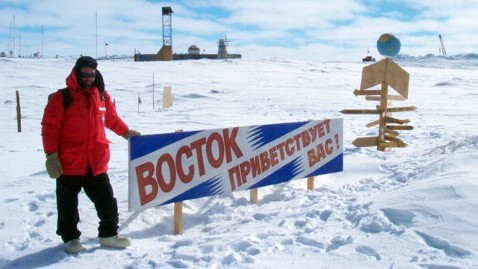Lake Vostok, Sealed in Antarctic Ice, Reached by Russian Drillers

Vostok Station, Antarctica, the Russian base directly above Lake Vostok. ( Michael Studinger/Lamont-Doherty Earth Observatory/KRT/Newscom)
Two and a half miles beneath Antarctica's ice lies Lake Vostok, a mysterious body of water, 160 miles long and 30 miles wide, that is believed to have been sealed off from the rest of the world for 20 million years.
Now, the Russians, who run the Vostok research station at the surface, say they may have reached the lake with a drill bit, though they are still checking their data. The plan was for the drill to break through the ice into the hidden lake, and automatically withdraw so as not to contaminate the water below.
"Great God! This is an awful place," wrote the English explorer Robert Falcon Scott when he reached the South Pole a century ago last month. Scott and his four comrades, beaten to the pole by Roald Amundsen's Norwegian expedition, died as they tried to trudge back to safety. And the climate is actually worse at Vostok station, where the Russians once measured a surface temperature of 129 degrees F below zero. (The current temperature, the Russians report, is about 40 below; it is late summer there.)
Lake Vostok, seen so far only on radar, is believed to be warmed by geothermal energy. But why drill to it, beyond feeling the tug of mystery?
"According to our research, the quantity of oxygen there exceeds that on other parts of our planet by 10 to 20 times. Any life forms that we find are likely to be unique on Earth," said Sergey Bulat, the chief scientist of Russia's Antarctic Expedition, as quoted by Russian Reporter magazine.
There are other scientists who are doubtful. Too much oxygen, they argue, could actually be toxic to life. So Lake Vostok could turn out to be unique - the first place found on Earth where there is water in liquid form but nothing living.
This could have implications for the search for life elsewhere in the solar system. Jupiter's moon Europa and Saturn's moon Enceladus have both been seen by NASA probes to have icy crusts, but, apparently, enough heat from inside to raise at least the possibility of hidden oceans. Europa in particular has been hopefully labeled as a possible home for extraterrestrial life. Space scientists would like to know a lot more about them. Could Lake Vostok, half a billion miles closer, offer clues as to what lies beyond, in the cold reaches of space?
The Russians, despite the cold, despite limited money for scientific research, have been drilling down toward Lake Vostok for 14 years now. What will they find in the water there?